The International Institute of Information Technology Hyderabad believes in diversity and runs a special mode of admission to induct talented students from rural hinterlands. We trace the remarkable journeys of two such youngsters from its inaugural batch that will leave you inspired.
This semester, when Prerna Gupta recorded her dance moves and sent it over to the Dance Club organizers for consolidation into one seamless video, it was a first for her. Until then, she hadn’t mustered courage to showcase such skills on campus. But breaking new ground is not new for her. Over the course of the last 3 years as a student of IIITH, she has steadily been clocking many ‘firsts. And trailblazing her way out of her hometown to pursue an engineering degree at a prestigious institute is just one of them.
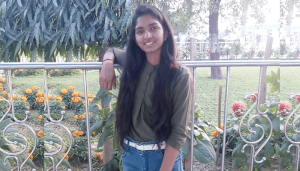
Powayan is an off-the-grid town located in the Shahjahanpur district of UP. According to Wikipedia, it has a population of around 28,000 with agriculture as its main economy. Connectivity to the rest of the world is typically through Shahjahanpur which is at least an hour away by road. Prerna’s father runs a modest stainless steel utensil store there and her mother is a home maker. But that didn’t stop them from dreaming big for their daughter. It definitely helped too that her older brother shared their views and believes in empowering women. Since he was aware of the myriad opportunities that exist, upon his insistence, in the 11th grade, Prerna applied for and was selected into Project Udaan – the government-sponsored free coaching camp for female engineering aspirants. Just getting to the coaching class itself which was located in Bareilly entailed a weekend logistical nightmare though: First a commute by bus to Shahjahanpur, followed by a 2-hour long train ride to Bareilly. Erratic train timings meant that she often had to abandon the sessions midway or risk reaching home in the dead of the night.
It was in 2018 that IIITH initiated a new mode of admission, known as the Special Channel of Admission (SPEC). “We started this after realising that a majority of our students came from Tier 1 and Tier 2 cities. It was the first time we were selecting students based on our entrance exam and interview,” says Prof. Jayanthi Sivaswamy, Chairperson of the Diversity Committee. Prerna confesses that at the time she didn’t know what IIITH was. “I thought it was just another college.” With her brother urging her to fill out application forms for various entrance exams, she had filled out one for this institute too. If Bareilly was ‘far’, then Moradabad – her center for the IIITH entrance exam was even further at 200 kms away. When news of her being shortlisted came in, there was the expected jubilation. But it also left everyone in a predicament. “Everyone was happy, but no one knew how far Hyderabad was and how to send me!” laughs Prerna. And then there was the question of paying the tuition fee. Luckily for them, the institute strongly believes that financial constraints should not deter meritorious students seeking quality education. There are a number of schemes through which full tuition support is guaranteed to admitted students.
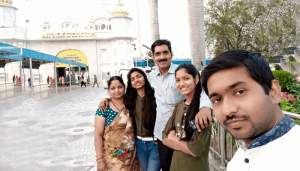
The Boy From Vuyyuru
Just like Prerna Gupta, Mohammed Kalesha too arrived on IIITH campus in August 2018 to pursue his BTech in Electronics and Communications Engineering. He had been studying at the Rajiv Gandhi University of Knowledge Technologies at Nuzvid, AP under the 6-year integrated BTech program when he was selected through the SPEC process at IIITH. Son of a farmer and homemaker from Vuyyuru in Andhra Pradesh, Kalesha has witnessed financial hardships since he was little. “My father was a metallurgical engineer at Rourkela. For reasons best known to him, he quit his comfortable job and decided to return to his hometown where he has been engaged in farming ever since,” he says.
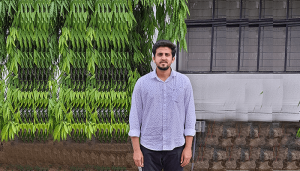
Born with an inquisitive mind, Kalesha recalls negotiating with the neighbourhood storekeepers for faulty and broken toys. These ‘rejects’ were then prised open and tinkered around with to understand their working mechanism. The father’s educational background helped in such endeavours: Pitching in often to assist whenever Kalesha was stuck with a problem, he would explain the nuances of circuitry and motors. Attributing his early interest in engineering to these informal experiments, the school-going Kalesha went on to create many ‘prototypes’, even bagging a prize in the school fair for a home security system.
Initial Challenges
Transitioning from high school to college is challenging for every freshman and it was no different for Prerna and Kalesha. Most noticeably, they were taken aback by the magnitude of workload facing them. “The academic level here is different. So I faced obvious difficulties in coping, besides other things,” says Prerna, admitting that she didn’t have the right knowledge of concepts. With a high level of absenteeism among teachers in her school, she often had to resort to self-study through rote learning which was woefully inadequate in the IIITH milieu. Kalesha who had established a great rapport with a professor at RGUKT and was used to bouncing ideas off him, took some time too to find his feet in IIITH. “Frankly the whole culture was very different for me. The main issue was that I was not able to go near professors and communicate with them. There was some sort of a fear in me in the first semester. Here, I didn’t feel free and comfortable enough to approach any prof. Plus the seating arrangement was given; with a class of around 250 members (of whom I knew none!), interrupting in the middle of a lecture was not something I looked forward to, I felt a bit awkward,” he reminisces.
Coping Strategies
“All SPEC students were toppers in their respective classes prior to coming to IIITH,” says Kalesha. But with a change in standards on campus, they were struggling to cope. To help such students, apart from TAs who are available to clarify doubts for each subject, some seniors pitch in by taking informal classes. In addition to this, the faculty is understanding and flexible enough to accommodate special requests. “In the first year when we had a bunch of consecutive assignment deadlines lined up, I wrote to Jayanti ma’am, explaining that i couldn’t keep up with the schedule and asked for an extension in deadline, “ says Prerna. Despite additional resources and special requests that were complied with, semester grades were the first to be impacted. For Prerna who just about made the cut at the end of the first semester with a one point difference in CGPA, it came as a rude shock. “If I had one point less, I would have been repeating the year,” she says. It spurred her to pull up her socks and focus better. “Now, I have learned how to study, how to focus on assignments because they matter too and because of this, I have gradually improved. From the initial 5.94 CGPA, in the last semester, I got 9,” she beams.
For a despondent Kalesha, it was his favourite professor Mahesh from RGKUT who instilled confidence in him. When he came back home after the first semester, Kalesha spent time introspecting to understand what he could be doing wrong. He began looking at the course material via online videos for the upcoming courses. “I got a bit of confidence by getting a head start on the coursework,” he says. From the next semester onwards, when the seating pattern was not rigid, he began to sit closer upfront and opening up with questions just like his former self. With better communication skills, he began to interact with everyone, including the seniors and got to know them better.
Attesting to their never-say-die attitude, Prof. Sivaswamy remarks, “We were quite impressed with the refreshingly different attitude towards education and aspirations of the SPEC candidates during the interview. This has helped them face the challenges in meeting IIITH’s high standards by not losing heart at the first instance of failure but facing it with a determination and self- belief. We don’t see this among many students who come through intense coaching and highly competitive exams”.
Pillars Of Support
In Powayan where patriarchy reinforces gender-based roles and stereotypes with the typical girl child getting married off sometimes even before completing school, the Gupta family is a trendsetter. Prerna concedes that she is fortunate to have the men in her family support her academic progress. “My father would never give permission for get-togethers or excursions with friends – a stand that is slowly changing too! But if it’s anything related to academics, he leaves no stone unturned to give me the best,” says Prerna. For someone who had no Wi-Fi connectivity until 2 months ago, the entire online academic year has only been possible thanks to the combined efforts of the family. “My brother and father used to leave their phones behind for me to use data to connect to the classes,” she says.
Kalesha too is aware of the sacrifices made by his family in order to ensure that he and his younger brother have access to quality education. Philosophically he likens the early constraints they faced to those that exist in the Engineering domain. “In Engineering, we need to build cost-effective things in order to be able to push them to the market and be efficient. So I relate to things that way.” With the underlying financial challenges, the family was uncertain about the prudence of leaving a college with complete tuition support to join another that seemed financially prohibitive. “I had to convince them about the institute, its placements and the fact that I can repay the tuition fee at the end of my BTech,” says Kalesha.
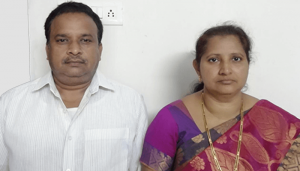
Marching On
As a BTech (Hons) student currently in his 3rd year, Kalesha will commence research under Dr. Zia Abbas at the Centre for VLSI and Embedded Systems Technologies (CVEST). For uncertain freshmen and other SPEC candidates, he has this to say, “Know your self-worth and don’t be ashamed in accepting your weaknesses. That’s the only way to progress”. Fully aware that she is probably the first female from her district “to have gotten this far,” Prerna says earnestly that where you come from doesn’t really matter in the end. Having bagged an online internship at Walmart that she needs to log in for, Prerna signs off with: “If your foundation is shaky, it doesn’t mean you won’t be able to advance. Generally everyone in IIITH is very helpful and plus there are tonnes of resources available – online and offline.” For Prof. Sivaswamy, to see the institute’s efforts to increase diversity among students pay off is a rewarding experience. “It has made a positive difference to the institute and to their lives,” she says.

Sarita Chebbi is a compulsive early riser. Devourer of all news. Kettlebell enthusiast. Nit-picker of the written word especially when it’s not her own.

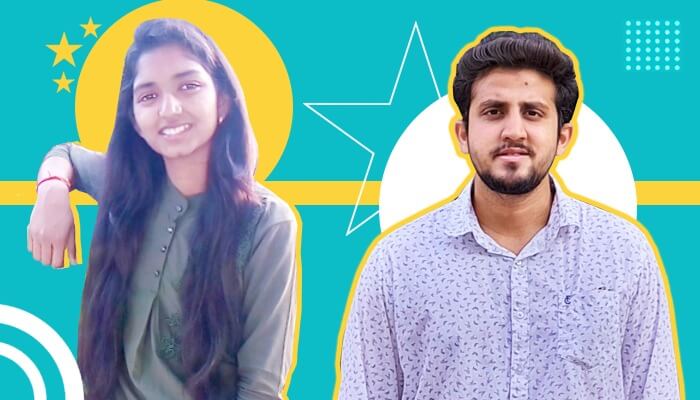
Great Kalesha. A lot more needs to be achieved. Keep going forward
Your classmate says: